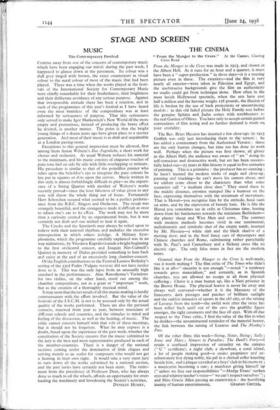STAGE AND SCREEN
MUSIC
The Contemporary Festival
COMING away from one of the concerts of contemporary music which have been engaging our minds during the past week, I happened to glance down at the pavement. Its colour was a dull grey tinged with brown, the exact counterpart in visual colour to the aural colour of most of the music that had been played. There was a time when the works played at the festi- vals of the International Society for Contemporary Music were chiefly remarkable for their freakishness, their brightness and their deliberate avoidance of any serious purpose. Against that irresponsible attitude there has been a reaction, and in such of the programmes of this year's festival as I have heard even the most brainless of the compositions was at least informed by seriousness of purpose. That this seriousness only served to make Igor Markewitch's New World all the more empty and pretentious, instead of producing the brave effect he desired, is another matter. The point is that the bright young things of a dozen years ago have given place to a sterner generation. And most of their music is as drab and unpalatable as a London paving-stone.
Exceptions to this general impression must be allowed, first among them Anton Webern's Das Augenlicht, a short work for chorus and orchestra. As usual Webern reduces his material to the minimum, and his music consists of exiguous touches of pure tone laid on side by side with little overlapping or mixture. His procedure is similar to that of the pointillist painter who relies upon the beholder's eye to integrate the pure colours he has put in squares or dots upon the canvas. Music written in this style is almost forbiddingly difficult to play—as the experi- ence of a String Quartet with another of \Vebern's works recently proved—since the least falseness of value given to any note will throw the whole thing out of focus. Fortunately Herr Scherchen secured what seemed to be a perfect perform- ance from the B.B.C. Singers and Orchestra. The result was strangely beautiful, and the strangeness made it difficult at once to adjust one's ear to its effect. The work may not be more than a curiosity created by an experimental brain, but it was certainly not drab and one wished to hear it again.
The Czechs and the Spaniards may always be relied upon to relieve with their national rhythms and melodies the excessive introspection in which others indulge. A Military Sym- phonietta, which the programme carefully explained was in no way militaristic, by Viteslava Kapralova made a bright beginning to the first orchestral concert, and Joaquin Nin-Culmell's Quintet in memory of Dukas provided something to lean back and enjoy at the end of an excessively long chamber-concert.
Of the English contributions to the Festival Lennox Berkeley's setting of the 23rd Psalm (Vulgate version) did not have justice done to it. This was the only lapse from an unusually high standard in the performances. Alan Rawsthorne's Variations for two violins, on the other hand, stood out among the chamber compositions, not as a great or " important " work, but as the creation of a thoroughly musical mind.
It may seem that the net result of all this music-making is hardly commensurate with the effort involved. But the value of the festivals of the I.S.C.M. is not to be assessed only by the actual quality of the works performed. There are also the personal contacts, renewed from year to year, between musicians of different schools and countries, and the stimulus to mind and feeling of the discussion, as well as the hearing, of music. The critic cannot concern himself with that side of these meetings, but it should not be forgotten. What he may express is a doubt, based upon the experience of the past week, whether the constitution of the Society ensures that the music submitted to the jury is the best and most representative produced in each of the member-countries. There is a danger of the national sections coming under the domination of little cliques and serving merely as an outlet for composers who would not get a hearing in their own right. It would take a very stern jury to turn down all the works submitted by a national section, and the past juries have certainly not been stern. The retire- ment from the presidency of Professor Dent, who has always done so much to oil the wheels, affords an opportunity for over- hauling the machinery and broadening the Society's activities.
DYNELEY HUSSEY.














































 Previous page
Previous page